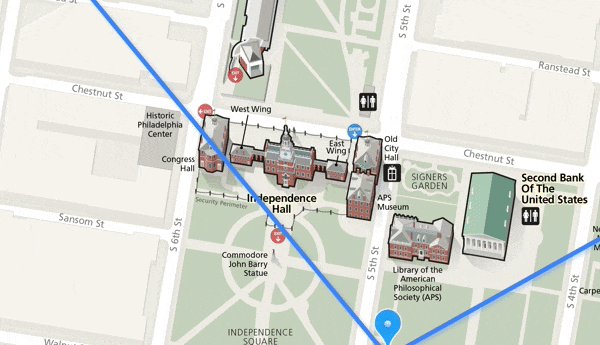AndroidImageLoader
AndroidImageLoader is a fork of the Image Loader component in libs-for-android.
The AndroidImageLoader is an Android library that helps to load images asynchronously. Like its upstream libs-for-android project, it executes image requests in a thread pool and provides caching support. The following features of libs-for-android are kept:
- Images are downloaded and saved to cache via a pool of background threads.
- Supports preloading of off-screen images into a memory cache.
- Supports prefetching of images into a disk cache.
HttpUrlConnectionis used for loading images, which respects cache control.- Custom
URLStreamHandlerFactoryis supported for creating connections to special URLs such ascontent://URIs. - Supports
Bitmaptransformations by accepting aContentHandlerfor loading images.
The AndroidImageLoader improves libs-for-android in the following ways:
- In addition to memory cache, the library also supports second level disk caching. Caching support in AndroidImageLoader is now made to depend on the TwoLevelLruCache library, which in turn depends on the more widely used
LruCacheandDiskLruCache. - Image requests are now placed into a LIFO task queue, which makes more sense in most scrolling scenarios.
- The API for view binding is now in a separate
ViewBinderclass. Applications can use theImageViewBinderclass to bind toImageViews or extend theAbstractViewBinderclass for custom views. Also,ImageViews within anAdapterViewno longer require a different kind of binding. OutOfMemoryErrors are automatically detected and caught. When memory is running low, the cache size is automatically decreased to give back more memory to the system.- Prefetching can now be supported out of the box via the
SinkContentHandlerand the HttpResponseCache library.
USAGE
The ImageLoader should be installed as a pseudo-system service. This is so that it can be used as a singleton and accessed across Activities. You do this by declaring a customized Application in the AndroidManifest.xml:
public class SamplesApplication extends Application {
private ImageLoader mImageLoader;
@Override public void onCreate() {
super.onCreate();
try {
mImageLoader = createImageLoader(this);
} catch (IOException e) {
}
}
@Override public void onTerminate() {
mImageLoader = null;
super.onTerminate();
}
@Override public Object getSystemService(String name) {
if (ImageLoader.IMAGE_LOADER_SERVICE.equals(name)) {
return mImageLoader;
} else {
return super.getSystemService(name);
}
}
...
}
An example of creating the ImageLoader instance can be:
private static ImageLoader createImageLoader(Context context)
throws IOException {
ContentHandler prefetchHandler = null;
try {
HttpResponseCache.install(
new File(context.getCacheDir(), "HttpCache"),
ImageLoader.DEFAULT_CACHE_SIZE * 2);
prefetchHandler = new SinkContentHandler();
} catch (Exception e) {
}
// Use a custom URLStreamHandlerFactory if special URL scheme is needed
URLStreamHandlerFactory streamFactory = null;
// Load images using the default BitmapContentHandler
ContentHandler bitmapHandler = new BitmapContentHandler();
bitmapHandler.setTimeout(5000);
return new ImageLoader(
streamFactory, bitmapHandler, prefetchHandler,
ImageLoader.DEFAULT_CACHE_SIZE,
new File(context.getCacheDir(), "images"));
}
Obtaining the ImageLoader from within an Activity is easy:
ImageLoader imageLoader = ImageLoader.get(context);
Binding an image to ImageView is done via ImageViewBinder:
ImageViewBinder binder = new ImageViewBinder(mImageLoader);
binder.bind(imageView, url);
Optionally you can set alternative images to display:
binder.setLoadingResource(R.drawable.loading);
binder.setErrorResource(R.drawable.unavailable);
By default images loaded from disk cache or network are faded in. You can disable this special effect by:
binder.setFadeIn(false);
Note that the ViewBinder automatically checks whether the target View is still requesting the same URL or already recycled to request another image.
Custom view binding is supported by extending the AbstractViewBinder<V> class and overriding at least the following two methods:
void onImageLoaded(V targetView, Bitmap bitmap, String url, LoadSource loadSource)void onImageError(V targetView, String url, Throwable error)
SAMPLES
Sample applications are provided to better understand how to use the library.
- ImageViewBinding: loading of images using the
ImageViewBinder. - CustomViewBinding: loading of images into custom views by extending the
AbstractViewBinderclass. - FlickrInterestingness: practical example of loading Flickr images from its Web API using the AndroidImageLoader in combination with the AndroidFeedLoader.
INCLUDING IN YOUR PROJECT
There are two ways to include AndroidImageLoader in your projects:
-
You can download the released jar file in the Downloads section.
-
If you use Maven to build your project you can simply add a dependency to this library.
<dependency> <groupId>com.wu-man</groupId> <artifactId>androidimageloader-library</artifactId> <version>0.1</version> </dependency>
CONTRIBUTE
If you would like to contribute code to AndroidImageLoader you can do so through GitHub by forking the repository and sending a pull request.
DEVELOPED BY
- David Wu - david@wu-man.com - http://blog.wu-man.com
LICENSE
Copyright 2012 David Wu
Copyright (C) 2010 Google Inc.
Licensed under the Apache License, Version 2.0 (the "License");
you may not use this file except in compliance with the License.
You may obtain a copy of the License at
http://www.apache.org/licenses/LICENSE-2.0
Unless required by applicable law or agreed to in writing, software
distributed under the License is distributed on an "AS IS" BASIS,
WITHOUT WARRANTIES OR CONDITIONS OF ANY KIND, either express or implied.
See the License for the specific language governing permissions and
limitations under the License.













